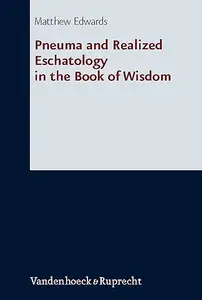
Free Download Matthew Edwards, "Pneuma and Realized Eschatology in the Book of Wisdom"
English | 2012 | ISBN: 3525535384 | PDF | pages: 274 | 2.1 mb
The Book of Wisdom's understanding of Israel's history, of contemporary politics and of the immortal fate of the persecuted sage can be understood to be part of one theological system. This system integrates texts and concepts from Jewish Wisdom, the biblical narratives of the patriarchs from Adam to Moses, eschatological hope and apocalyptic language, an understanding of the spirit of God in the enabling of prophets and leaders and, most distinctively, the Stoic concept of pneuma. This last concept unites the biblical resources and allows Wisdom, using eschatological language, to speak of the ordering of the cosmos for the judgement for the wicked and the exaltation of God's people in the present age. Matthew Edwards addresses first the question of the literary unity of Wisdom. This is followed by an examination of the differing uses of the term pneuma within Wisdom, that is as divine agent of salvation, the means of the ordering the cosmos and the substance from which souls are composed. The nature of personal salvation within Wisdom is also considered and shown to be an integral part of the understanding of the cosmos, ordered for judgement and exaltation. Finally, this notion of the ordering of the comos and history for God's people is discussed with its consequences for Jewish life under contemporary Hellenistic and Roman rule. Prepared as a doctoral dissertation under the direction of J. Schaper and presented to the University of Aberdeen, this investigation of the book of Wisdom contends that it uses the Stoic concept of pneuma to integrate various elements of the Jewish biblical tradition, including sapiential texts, the narratives of the patriarchs and the exodus, eschatological hope and apocalyptic language, and the work of the spirit of God in enabling prophets and leaders. After dealing with introductory matters concerning the book of Wisdom and the concepts of pneuma and eschatology within it, it offers an argument for the theological unity of Wisdom's different depictions of salvation. Then it discusses how the miracles of the Exodus-Numbers narrative are understood as workings of pneuma within the cosmos, and considers how an understanding of the cosmos as ordered by pneuma might be related to a traditional Jewish understanding of the world as created. Next after discussing pneuma, Stoicism, and anthropology, it considers "spirit" in the biblical tradition (OT, LXX, Philo). Then it treats the realized eschatology of Wisdom, with reference to personal eschatology, Hellenistic kingship and wisdom, and providence and fate. Edwards concludes that Wisdom follows the Hellenistic trend toward the philosophical explanation of human life by understanding it as set within a larger cosmic and physical system. New Testament Abstracts (57/1-2013), Boston College School of Theology and Ministry
Pneuma and Realized Eschatology in the Book of Wisdom Torrent Download , Pneuma and Realized Eschatology in the Book of Wisdom Watch Free Link , Pneuma and Realized Eschatology in the Book of Wisdom Read Free Online , Pneuma and Realized Eschatology in the Book of Wisdom Download Online
